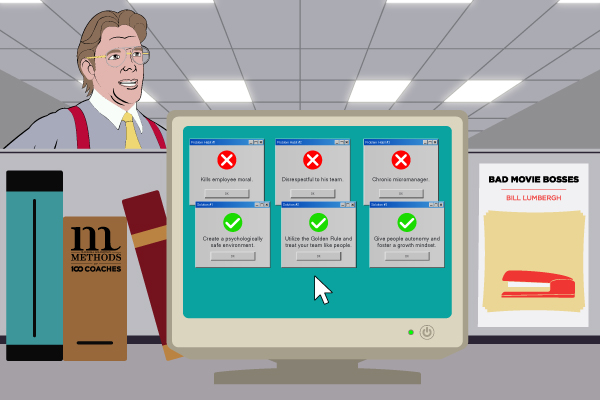Movies and TV have given us no shortage of portraits of people we’d rather not encounter in real life — just think of all the nefarious villains and unscrupulous anti-heroes that have graced the screen. If you saw Thanos or Gordon Gekko on the street, you’d run the other way screaming. We can look at these things from a distance and recoil with horror, or laugh at the absurdity of them, but we do it with the knowledge that we’re safe from having to deal with these people in our day to day. But what about those times when the screen all too closely resembles our reality? That’s when things get interesting. Throughout the history of the screen, this seems to happen with one particular archetype — that of the bad boss.

From Billy Wilder’s The Apartment to the extremely popular The Office, we’ve familiarized ourselves with a number of different stereotypes for bad bosses and seen first hand — well, second hand — how it can wreck a company, drive good people up a wall (and out the door), and negatively impact bottom lines. Here, in this blog series we’ll be examining some classic “bad bosses” from cinema and television, and explain what — if they had even a modicum of self-awareness — they would need to do to change their behavior for the better. Whether it’s the well-meaning but wrongheaded optimism of Michael Scott, the outright tyranny of a Miranda Priestly, we’ve provided the antidote.
For this blog, we’ll be looking at one of cinema’s most iconic bad bosses: Bill Lumbergh. If the phrase “Yeahhhh, I’m gonna need …” sounds at all familiar, you’ve probably seen the 1999 Mike Judge movie Office Space and were already picturing the arm up on the cubicle wall that lets you know something bad is coming. Heralded for its painfully accurate portrayal of the corporate bosses of our collective worst nightmares, the scariest thing about Bill is that he could very well be your boss. The brilliance of this movie’s caricature is that it so closely resembles reality — he wears gaudy shirts, drives a Porsche with obnoxious vanity plates, and treats everyone under his charge like human chattel — you’re likely to mistake this fictional character for a real one. Aside from needing an attitude adjustment (because that smug superiority just won’t do) here are a few toxic leadership habits Bill has, in particular, that could be easily remedied, should he desire to change for the better (which, for the sake of this article, we’re assuming he does).
Low Employee Morale
Given that Bill is the film’s chief antagonist, it’s no surprise that the main characters dislike him, otherwise, there would be no dramatic engine to the film. But, in actuality, it’s clear that everyone dislikes him. This is best illustrated in the scene where Bill is given a birthday party by his team. The comically lackluster singing of the group during the birthday song is all you need to know about how these employees feel. It may be his 41st birthday, but from the sound of it, they’re hoping it’s his last. What’s “happening,” Bill? A mutiny in progress!
THE SOLUTION: Bill needs to create a psychologically safe environment for his people to feel secure in their jobs and in the work they do. By building a strong culture of mutual respect and trust, he can foster an environment conducive to higher employee morale.
The Methods course on Basic Needs from Dr. Raj Raghunathan would help him do just that.
Disrespectful to His Team
The way he talks to his team: is condescending, rude, and passive-aggressive. He treats everyone with an almost obvious sense of disdain, talking down to them, and not taking their feelings into account. In doing this, he also doesn’t respect peoples’ time — just reference the scene in which he stops Peter on the way out the door of a Friday afternoon just to ask (err, tell) him to come in and work on Saturday … and Sunday. That’s not very cool, “mmkay,” Bill?
THE SOLUTION: In a word — treat your team like you’d want to be treated. Just because he’s their boss doesn’t mean he gets to act like he’s better than them. When a boss does this, it ruins the trust a team has in their leader, and reduces both their motivation and commitment to help the company succeed. He could try adjusting his tone, and framing things in a less accusatory manner.
The Methods course on Belonging at Work from Dr. Raj Raghunathan would be a great way for him to learn how and why to implement these concepts.
Micromanagement:
This is best understood by the “cover sheet” scene. In it, a new requirement for cover sheets on standard reports that the company regularly delivers — a TPS report — is overlooked by Peter, an employee. The report isn’t due out until the next day, and though Peter apologizes and promises to rectify the issue, Bill does not give him any benefit of the doubt and continues to harp on the issue long after it’s appropriate. For one, this cover sheet is a more or less incidental technicality; it’s nothing that a boss needs to be involved in. He necessarily harps on what is ultimately a minor issue, ultimately making Peter feel much worse about it than was necessary or appropriate. What would be “terrific,” is if Bill could get a clue!
THE SOLUTION: First, he needs to let people do their jobs. Micromanaging isn’t only bad for the people being micromanaged, but it sends a bad message on behalf of the company. Essentially, it telegraphs that you don’t trust your own hiring practices. If you hired someone for a job, shouldn’t that by default means that you trust them to do said job? Second: he needs to foster a growth mindset environment so that employees don’t feel scared to make mistakes. Successful teams all have one thing in common: psychological safety. They feel trusted by their leaders and trust their leaders in return. They know their objectives and are given the resources to achieve them; they don’t need someone to come and nitpick their work.
And, when they do make a mistake — as we all do, all the time — they understand it’s “failing forward” and just a stepping stone on the way to success. Dr. Raj Raghunathan’s course on Work Autonomy would be a great way for Bill to learn how to stop micromanaging and why it’s important.
Now, it might be helpful to reiterate here that Bill Lumbergh is a fictional boss, but that doesn’t mean that people everywhere don’t experience these kinds of problems with poor management every day. With online training like the Methods platform, bad bosses have no excuse not to get better. With bite-sized videos delivered through an immersive, interactive LMS, leadership and management training has never been simpler. Don’t be a Bill Lumbergh, get access to Methods today.





